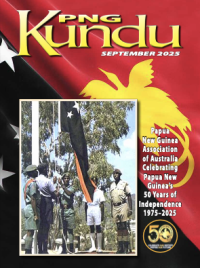Another near miss: Phil Latz
Toward the end of 1969, beginning a new tour of duty, I found myself at Wewak on the mainland of Papua New Guinea, again flying a two passenger Bell G3B1 turbo charged machine. This time, to join a survey team based at Frieda River searching for copper. One of our unlicensed engineers, Barry, was my passenger out of Wewak. He had helped me change a time expired engine, for which I signed the certification paperwork, being licensed to do so.
On the trip back to camp we were laden with supplies for this two-hour-plus flight. It was new territory for me, so I constantly referred to my map. It was hot and humid so our windows and vents were open.
Half way to Ambunti, my map blew out. It was the first time this had happened to me. In Australia, I’d heard from others that this was not necessarily a problem: just circle down with it, watch it land, then do likewise and retrieve it. I had no chance here with solid jungle below. What to do? It was mid afternoon and to turn back would mean most of another day lost. As the aircraft had already been away for several days we were urgently required back at camp.
“Barry, you’ve been at the camp for weeks, can you direct me to it?”
“Sure, no problem.”
“‘You reckon we can find it okay?”
“Yeah, yeah, let’s carry on.”
Ambunti, on the wide, muddy, Sepik River was not difficult to find and after refueling we continued on upriver. Large storm clouds sat on the 3,500 m high central mountain range which stretches for hundreds of kilometers along the central spine of the country. Clouds also obscured the many valleys leading down to the flat country and lightning was busy in the dark clouds ahead. We needed to find the correct valley, our camp being located some distance along it, in steep foothills leading up to the main range. I began to feel apprehensive as fading light coupled with worsening weather and especially, not knowing where we were. After flying for more than an hour over dense jungle and passing many entrances to the high mountains, Barry said “It’s up that valley on the left.”
“Good, I was hoping you’d see it soon.’”
Ten minutes later he said, “Sorry Phil, I don’t think we’ve got the right one, must be the next valley.”
We retraced our route and continued flying west to the next entrance into the damp, cloud shrouded mountains. My heart was sinking quicker than the often inaccurate fuel gauge.
“See the camp yet?” I asked apprehensively after more minutes passed.
“No, it’s not this valley either.”
What a situation! I had relied on another person, and as a result we were lost with solid jungle below, storm clouds ahead, low on fuel and limited daylight. My mouth was dry with tension and my knuckles white on the controls.
“Barry, this is getting serious. You better think carefully about recognizing the correct valley entrance. So far I haven’t even seen anywhere to land when it gets dark, let alone if we run out of fuel.”
Barry sighed and knitted his brow in concentration.
“I’m quite sure we haven’t passed our valley yet so it must still be ahead. The one we are coming to now looks like it.”
“I doubt we have enough fuel to check any more after this. Let’s just hope there is somewhere to land safely if it’s not the right one. I don’t fancy having to fall into the tall timber around here. And we can’t give anybody an accurate position if they have to look for us!”
He knew how vital this information was. At that time, most crashed aircraft were not found for days, weeks, or sometimes never, unless the location was known or survivors walked out. The jungle simply swallowed them up. Locator beacons in small aircraft would only be introduced years later and GPS was yet to be invented.
The minutes crawled by in tense silence as we entered another steep sided valley. There was nothing left to say. We could both see the fuel gauge hovering over empty in the dim light.
“This looks familiar, keep going Phil.” Barry leaned forward, as if to get a better view. “This is it, see the track down to the river. That’s where we collect supplies from the canoes when the river level is low. The camp should be another few miles up river on the right.”
Then we saw smoke from a fire. Someone was in the unending greenery below.
“The camp,” Barry squealed. “See it?”
“Yes, thank heavens.”
After landing, I dipped the fuel tanks; only three to five minutes of fuel remained. It was another near miss and taught me to be extremely skeptical of other people’s well-meaning assurances, especially if it could affect my livelihood or health. It was my life and license at stake, and I figured if I kept myself alive, then my passengers should survive, even if I ignored their advice.
For more, see www.phillatz.com



